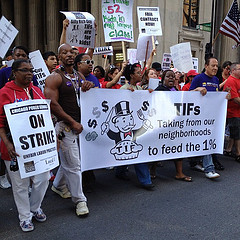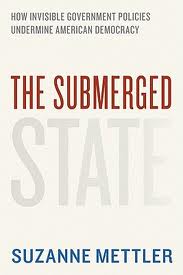
What Does the Chicago Teachers’ Strike mean for Obama and the Democrats?
Angry and extensive coverage has characterised last week’s Chicago teachers’ strike as a series of splits: children’s interests vs. teachers’ interests; ‘reform’ vs. ‘status-quo’; elites vs. the public. Whereas a majority of Chicagoans supported the strikers, much of the media coverage has been opposed. CNN’s coverage is a good example (seeNavarrette’s eye-popping statement that unions ‘protect teachers from public demands for…a better education for our children.’) The first two of these splits fit a long-standing trope in education policy from A Nation At Risk to No Child Left Behind. It is encapsulated in Terry Moe’s recent book ‘Special Interest’ amongst many others: the reformist demand for greater charter- or voucher-based choice and accountability, and opposition to teacher unions. But the most interesting split here is within the Democratic …
Santorum, Catholicism, and the American ‘Wall of Separation between Church and State’
When Rick Santorum claimed that JFK’s 1960 ‘separation of church and state’ Houston campaign speech made him want to throw up, he was rightly criticized for it. Kathleen Townsend for the Washington Post said ‘Either Santorum doesn’t know his American history or he is purposefully rewriting it.’ Working in the wonderful New York State Archives in Albany this week I found a great deal of material on Catholic religious school aid controversies, which shed light on the history of US anti-Catholicism and ‘Wall of Separation between Church and State’ rhetoric. Since Santorum is a Catholic and so was JFK, along with fully a quarter of all Americans, examining such materials may help us to understand why Santorum made such remarks, …

Book Review: The Submerged State: How Invisible Government Policies are Undermining American Democracy
The Submerged State: Atlantis? No, a slim and highly readable volume in which Suzanne Mettler describes how certain public policies have become highly resistant to reform and damaging to American democracy. By ‘submerged state’ Mettler means a set of indirect government subsidies and benefits whose size and beneficiaries, indeed whose very existence, is largely invisible to the public. Some types of governmental intervention are highly visible: most citizens are aware of them and know something about what they are, how they work and who benefits from them. For instance, most people know about the veterans’ benefits offered by the G.I. Bill. But others are more ‘submerged’, hidden either because they are channelled through private delivery organizations or because they come to …










